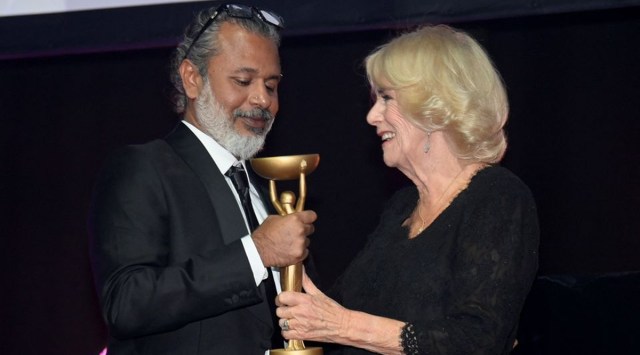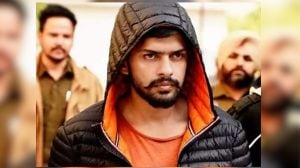When a ghost gets a voice, the absurd tell Sri Lanka’s real stories of love, loss
The 47-year-old Sri Lankan, the winner of this year’s Booker Prize for his second novel, The Seven Moons of Maali Almeida (Penguin), however, is unlikely to be the one writing those stories.
 Queen Consort Camilla presents Shehan Karunatilaka with the trophy for the Booker Prize, in London. (Reuters)
Queen Consort Camilla presents Shehan Karunatilaka with the trophy for the Booker Prize, in London. (Reuters)Off the top of his head, Shehan Karunatilaka can think of at least three plot lines for a potential novel from the massive people’s protests that the economic crisis in Sri Lanka triggered earlier this year against its political leadership: “There can be one in a petrol queue. There are so many characters in there, definitely a potential drama; Aragalaya (Sinhalese word for struggle) went on for three months. You can do an aragalaya love story. And because it’s so well-documented, your research is already there, you can do a story about a family. Suddenly, they are the finance minister, the prime minister and the president, and within three months, they are neither,” he tells The Indian Express in a Zoom interview.
The 47-year-old Sri Lankan, the winner of this year’s Booker Prize for his second novel, The Seven Moons of Maali Almeida (Penguin), however, is unlikely to be the one writing those stories.
“I don’t like writing about contemporary stuff. That’s why I don’t do journalism very well. I feel very uncomfortable because, what do I know? I like having the space of time, so your imagination can be more free,” says the Colombo-based Karunatilaka, the second Sri Lanka-born writer, after Michael Ondaatje, to win the prestigious £50,000 annual award.
The Seven Moons of Maali Almeida was first published in the subcontinent as Chats with the Dead in 2020, two years before its international release. A portion of the novel appeared as a short story in The Indian Express Sunday magazine fiction-special issue in December 2019.
The ethnic violence between the country’s Sinhalese and Tamil population that sparked off in 1983 looms large over Sri Lanka’s literary landscape, in the works of Romesh Gunesekera, Shyam Selvadurai, Carl Muller and others.
When Karunatilaka began work on The Seven Moons of Maali Almeida in 2010-11, it was in the aftermath of the nearly three-decade-long civil war or what the writer calls, “the war we thought would never end”.
“My initial idea or conceit was for it to be a ghost story. If the silenced voices of Sri Lanka’s many conflicts were allowed to speak and speak freely, what would they sound like? Would they argue? What stories would they have to tell? What was freshest in mind was 2009. We knew there were huge civilian casualties, the numbers kept getting pushed around. There was no truth or reconciliation, at least not enough. They were arguing about whose fault it was rather than looking at why so many people died. And so, I thought a ghost story would be a neat way of getting these victims to speak. But I wasn’t comfortable, because it was contemporary history. In South Asia, you always worry about offending the wrong people,” he says.
Karunatilaka set his absurdist noir in 1989 instead, at the peak of the conflict, removed from the immediacy of 2009. Maali Almeida, murdered war photographer, punter and still-in-the-closet gay man wakes up dead and has to figure out who his killer could be.
He is also running against a deadline — the cruel irony of even the afterlife — within which to deliver a cache of unseen photographs for the world to discover what really is going on in Sri Lanka. “As a teenager, I wasn’t aware of much of the politics but I remember how uniquely messed up it was for Sri Lanka. We had the LTTE, the JanathaVimukthi Peramuna (JVP, the Marxist-Leninist Communist Party in Sri Lanka), the Indian Peacekeeping Force on the ground. This book is a whodunit, with a bit of politics mixed in it. But within that framework of a typical murder mystery, I got to explore this period I wasn’t that aware of at 14-15 (years of age). It’s only later that I read about it and found out that it was more absurd than I ever thought it was,” he says.
The freedom-of-speech debate has only intensified since the attack on writer Salman Rushdie in New York in August this year. As a writer, though, Karunatilaka admits, he has always preferred to err on the side of caution. His new collection of short stories, Birth Lottery and Other Surprises (Hachette India), has just been published.
“Those were a lot of stories collected over 20 years of writing. During the pandemic, I picked the best and I did exclude a few stories, because I thought, maybe this might offend certain political or religious interests. Look, I’m not a hero. I’m not an activist. I know we speak of freedom of speech. But, in some countries, it is not something you take for granted. We have had periods in our history where it’s been very dangerous to speak out. I’ve got young kids, I’d like to live a long and healthy life. And it’s only a short story,” he says.





- 01
- 02
- 03
- 04
- 05


























